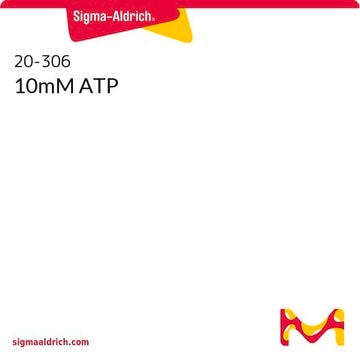Alle Fotos(1)
Wichtige Dokumente
MAK133
ADP Assay Kit
sufficient for 100 assays (bioluminescent)
Anmeldenzur Ansicht organisationsspezifischer und vertraglich vereinbarter Preise
Alle Fotos(1)
About This Item
UNSPSC-Code:
12161503
NACRES:
NA.84
Empfohlene Produkte
Verwendung
sufficient for 100 assays (bioluminescent)
Nachweisverfahren
chemiluminescent
Relevante Krankheit(en)
hematological disorder; cancer
Lagertemp.
−20°C
Allgemeine Beschreibung
Adenosine diphosphate (ADP) is a nucleoside that plays a critical role in energy transfer reactions. ADP is produced from adenosine triphosphate via the action of ATPases. ADP also plays a critical role in platelet function. ADP, stored in plate-dense granules, is released upon platelet activation where it acts on purinergic receptors to mediate intracellular signaling and platelet aggregation.
The ADP Assay kit provides a simple and direct procedure for measuring ADP levels in cells and other biological samples. The assay involves two steps. In the first step, the working reagent lyses cells to release ATP and ADP. In the presences of luciferse, ATP immediately reacts with the Substrate (D-luciferin) to produce light. The light intensity is a direct measure of the intracellular ATP concentration and is stable over several minutes.
In the second step, the ADP is converted to ATP through an enzyme reaction. This newly formed ATP then reacts with the D-luciferin as in the first step. The second light intensity measured represents the total ADP and ATP concentration in the sample.
The ADP Assay kit provides a simple and direct procedure for measuring ADP levels in cells and other biological samples. The assay involves two steps. In the first step, the working reagent lyses cells to release ATP and ADP. In the presences of luciferse, ATP immediately reacts with the Substrate (D-luciferin) to produce light. The light intensity is a direct measure of the intracellular ATP concentration and is stable over several minutes.
In the second step, the ADP is converted to ATP through an enzyme reaction. This newly formed ATP then reacts with the D-luciferin as in the first step. The second light intensity measured represents the total ADP and ATP concentration in the sample.
Eignung
Suitable for the detection of ADP in cells, tissue and other biological samples.
Prinzip
The ADP Assay kit provides a simple and direct procedure for measuring ADP levels in cells and other biological samples. The assay involves two steps. In the first step, the working reagent lyses cells to release ATP and ADP. In the presences of luciferse, ATP immediately reacts with the substrate (D-luciferin) to produce light. The light intensity is a direct measure of the intracellular ATP concentration and is stable over several minutes.
Luciferase ATP + D-Luciferin + O2 → oxyluciferin + AMP + PPi + CO2 + light
In the second step, the ADP is converted to ATP through an enzyme reaction. This newly formed ATP then reacts with the D-luciferin as in the first step. The second light intensity measured represents the total ADP and ATP concentration in the sample.
Luciferase ATP + D-Luciferin + O2 → oxyluciferin + AMP + PPi + CO2 + light
In the second step, the ADP is converted to ATP through an enzyme reaction. This newly formed ATP then reacts with the D-luciferin as in the first step. The second light intensity measured represents the total ADP and ATP concentration in the sample.
Signalwort
Warning
H-Sätze
Gefahreneinstufungen
Aquatic Chronic 3 - Skin Sens. 1
Lagerklassenschlüssel
10 - Combustible liquids
Hier finden Sie alle aktuellen Versionen:
Analysenzertifikate (COA)
Lot/Batch Number
Die passende Version wird nicht angezeigt?
Wenn Sie eine bestimmte Version benötigen, können Sie anhand der Lot- oder Chargennummer nach einem spezifischen Zertifikat suchen.
Besitzen Sie dieses Produkt bereits?
In der Dokumentenbibliothek finden Sie die Dokumentation zu den Produkten, die Sie kürzlich erworben haben.
Sepinoud Firouzmand et al.
Neurourology and urodynamics, 39(3), 926-934 (2020-02-13)
To characterize purinergic signaling in overactive bladder (OAB). Mucosal biopsies were taken by flexible cystoscopy from patients with storage symptoms referred to Urology Departments of collaborating hospitals. Immunohistochemistry (n = 12) and Western blot analysis (n = 28) were used to establish the qualitative
Aggregation of blood platelets by adenosine diphosphate and its reversal.
Born G V R
Nature, 194(4832), 927-929 (1962)
Hongshan Ge et al.
Molecular and cellular endocrinology, 443, 128-137 (2017-01-17)
To explore the roles of mitochondrial Uncoupling Protein 2 (UCP2) in cumulus cells (CCs), human CCs were cultured in vitro, and the UCP2 was inhibited by treatment with Genipin, a special UCP inhibitor, or by RNA interference targeting UCP2. No significant
The membrane ATPase of Escherichia coli: I. Ion dependence and ATP-ADP exchange reaction.
Roisin M P and Kepes A
Biochimica et Biophysica Acta - Bioenergetics, 275(3), 333-346 (1972)
Sofia Doello et al.
Current biology : CB, 31(8), 1606-1615 (2021-02-12)
The ability to resume growth after a dormant period is an important strategy for the survival and spreading of bacterial populations. Energy homeostasis is critical in the transition into and out of a quiescent state. Synechocystis sp. PCC 6803, a
Unser Team von Wissenschaftlern verfügt über Erfahrung in allen Forschungsbereichen einschließlich Life Science, Materialwissenschaften, chemischer Synthese, Chromatographie, Analytik und vielen mehr..
Setzen Sie sich mit dem technischen Dienst in Verbindung.





